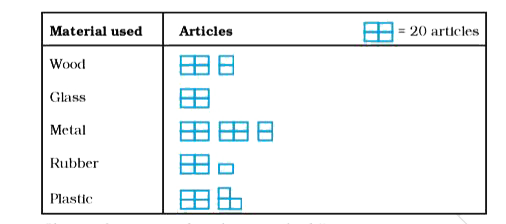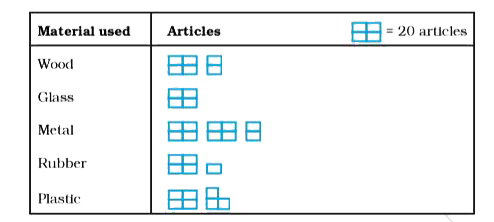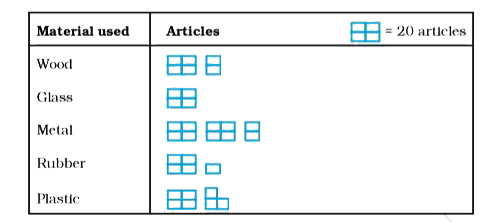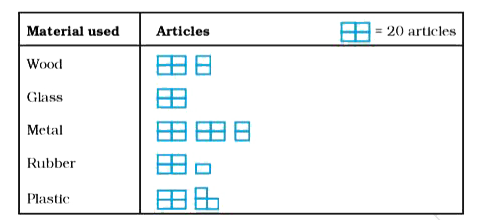Four children of Class VIII were asked to create some creative articles from the waste material. On completion of the assignment, the teacher gave the following observations. On the basis of this information adjudge the most creative child.
Most of the time uses imagination, is conscious not to use expensive material
Discusses with teacher constantly and asks for approval at each step
With little guidance, can make reasonably good items
Skillful and possesses a vision to convert waste material into productive items
The correct Answer is:D
Similar Questions
Students of Class VI in a school were given a task to count the number of articles made of different materials in the school. The information collected by them is represented as follows:

Observe the pictograph and answer the following questions:
Which material is used in minimum number of articles?
View SolutionStudents of Class VI in a school were given a task to count the number of articles made of different materials in the school. The information collected by them is represented as follows:

Observe the pictograph and answer the following questions:
Which material is used in exactly half the number of articles as those made up of metal?
View Solution
Knowledge Check
A teacher asks every child to use some waster material from their homes and make something useful out of it.
The pedagogical intention of the teacher is not toAorganise an exhibition of best articles made out of wasteBjudge the best student of the classCdevelop creativity among childrenDmake children understand the concept of recycle, reuse and reduceRead the passages carefully and select the best answer to each question out of the given four alternatives.
Computers have become indispensable in the modern times. From information to having fun, you can possibly do everything with the help of this amazing machine. For the modern day child, computers are vital and the amount of time that they devote on them has constantly been on the rise. One of the most popular things with children when it comes to the computer are video games or the computer games. From puzzles to racing, action to sports, strategy to adventure, computer games are possibly the biggest addiction with most children. With companies such as Sony and Microsoft going all out to promote Xbox and Play-station to children worldwide, the allure to these games has only got better. These video games not only help in making child.s brain sharper through mental stimulation but it also helps relieve them of anxiety or pain. In some cases, games have proved to aid in dyslexic kids reading better. Since adults also love playing games, it can be a time of bonding between adults and children, increasing the amount of time spent together especially when time spent by parents and children is very less nowadays. On the other hand, the addiction to these computer games can severely harm the child. Since children keep on playing for long hours, it can lead to eye damage. The impact of excessive visual medium is evident as a large number of children these days start wearing spectacles from an early age. Long hours of playing computer games can also result in headaches and dizziness.
One of the most popular things with children when it comes to the computer is?AXbox and Play-stationBVideo games or the computer gamesCPuzzles to racingDAction to sportsThe e-waste (Management and Handling) Rules. 2011, notified by the Ministry of Environment and Forests, have the potential to turn a growing problem into a developmental opportunity. With almost half-a-year to go before the rules take effect, there is enough time to create the necessary infrastructure for collection. dismantling and recycling of electronie waste. The focus must be on sincere and efficient implementation. Only decisive action can reduce the pollution and health costs associated with India's hazardous waste recycling industry. If India can achieve a transformation, it will be creating a whole new employment sector that provides good wages and working conditions for tens of thousands. The legacy response of the States to even the basic law on urban waste, the Municipal Solid Wastes (Management and Handling) Rules has been one of indifference, many cities continue to simply burn the garbage or dump it in lakes. With the emphasis now on segregation of waste at source and recovery of materials. it should be feasible to implement both sets of rules efficiently. A welcome feature of the new ewaste rules is the emphasis on extended producer responsibility. In other words, producers must,take responsbility for the disposal of end of-life products For this provision to work, they must ensure that consumers who sell scrap get some form of financial incentive,
The e-waste rules, which derive from those pertaining to hazardous waste, are scheduled to come into force on May· 1, 2012. Sound as they are, the task of scientifically disposing a few hundred thousand tonnes of trash electronics annually depends heavily on a system of oversight by State Pollutions Control Boards:(PCBs). Unfortunately, most PCBs remain unaccountable and often lack the resources for active enforcement. It must be pointed out that although agencies handling e-waste must obtain environmental clearances and be authorised and registered by the PCBs even under the Hazardous Wastes (Management, Handling and Transboundary Movement) Rules 2008, there has been little prnctical impact. Over 95 per cent of electronic waste is collected and recycled by the informal sector. The way forward is for the PCBs to be made accountable for enforcement of thee- waste rules and the levy of penalties under environmental laws. Clearly, the first order priority is to create a system that will absorb the sn,oo0-strong workforce in the informal sector into the proposed scheme for scientific recycling. Facilities must be . · created to upgrade' the skills of these workers through training and' their occupational health must be ensured.
Recycling ofo-wasteis one of the biggest challenges today. In such 'a time, when globalisation and information technology are growing at a pace which could only be imagined few years back, e-waste and its hazards have become more prominent over a period of time arid should be given immediate attention.
Which of the following can be one of the by-products of effective e-waste management?AIndia can guide other countries in doing so.BIt will promote international understanding.CIt will promote national integrationDIt will create a new employment sector.
Students of Class VI in a school were given a task to count the number of articles made of different materials in the school. The information collected by them is represented as follows:

Observe the pictograph and answer the following questions:
Which material is used in maximum number of articles?
View SolutionStudents of Class VI in a school were given a task to count the number of articles made of different materials in the school. The information collected by them is represented as follows:

Observe the pictograph and answer the following questions:
What is the total number of articles counted by the students?
View SolutionThe e-waste (Management and Handling) Rules. 2011, notified by the Ministry of Environment and Forests, have the potential to turn a growing problem into a developmental opportunity. With almost half-a-year to go before the rules take effect, there is enough time to create the necessary infrastructure for collection. dismantling and recycling of electronie waste. The focus must be on sincere and efficient implementation. Only decisive action can reduce the pollution and health costs associated with India's hazardous waste recycling industry. If India can achieve a transformation, it will be creating a whole new employment sector that provides good wages and working conditions for tens of thousands. The legacy response of the States to even the basic law on urban waste, the Municipal Solid Wastes (Management and Handling) Rules has been one of indifference, many cities continue to simply burn the garbage or dump it in lakes. With the emphasis now on segregation of waste at source and recovery of materials. it should be feasible to implement both sets of rules efficiently. A welcome feature of the new ewaste rules is the emphasis on extended producer responsibility. In other words, producers must,take responsbility for the disposal of end of-life products For this provision to work, they must ensure that consumers who sell scrap get some form of financial incentive,
The e-waste rules, which derive from those pertaining to hazardous waste, are scheduled to come into force on May· 1, 2012. Sound as they are, the task of scientifically disposing a few hundred thousand tonnes of trash electronics annually depends heavily on a system of oversight by State Pollutions Control Boards:(PCBs). Unfortunately, most PCBs remain unaccountable and often lack the resources for active enforcement. It must be pointed out that although agencies handling e-waste must obtain environmental clearances and be authorised and registered by the PCBs even under the Hazardous Wastes (Management, Handling and Transboundary Movement) Rules 2008, there has been little prnctical impact. Over 95 per cent of electronic waste is collected and recycled by the informal sector. The way forward is for the PCBs to be made accountable for enforcement of thee- waste rules and the levy of penalties under environmental laws. Clearly, the first order priority is to create a system that will absorb the sn,oo0-strong workforce in the informal sector into the proposed scheme for scientific recycling. Facilities must be . · created to upgrade' the skills of these workers through training and' their occupational health must be ensured.
Recycling ofo-wasteis one of the biggest challenges today. In such 'a time, when globalisation and information technology are growing at a pace which could only be imagined few years back, e-waste and its hazards have become more prominent over a period of time arid should be given immediate attention.
What, according to the passage, is important now for ewaste management?
View SolutionThe e-waste (Management and Handling) Rules. 2011, notified by the Ministry of Environment and Forests, have the potential to turn a growing problem into a developmental opportunity. With almost half-a-year to go before the rules take effect, there is enough time to create the necessary infrastructure for collection. dismantling and recycling of electronie waste. The focus must be on sincere and efficient implementation. Only decisive action can reduce the pollution and health costs associated with India's hazardous waste recycling industry. If India can achieve a transformation, it will be creating a whole new employment sector that provides good wages and working conditions for tens of thousands. The legacy response of the States to even the basic law on urban waste, the Municipal Solid Wastes (Management and Handling) Rules has been one of indifference, many cities continue to simply burn the garbage or dump it in lakes. With the emphasis now on segregation of waste at source and recovery of materials. it should be feasible to implement both sets of rules efficiently. A welcome feature of the new ewaste rules is the emphasis on extended producer responsibility. In other words, producers must,take responsbility for the disposal of end of-life products For this provision to work, they must ensure that consumers who sell scrap get some form of financial incentive,
The e-waste rules, which derive from those pertaining to hazardous waste, are scheduled to come into force on May· 1, 2012. Sound as they are, the task of scientifically disposing a few hundred thousand tonnes of trash electronics annually depends heavily on a system of oversight by State Pollutions Control Boards:(PCBs). Unfortunately, most PCBs remain unaccountable and often lack the resources for active enforcement. It must be pointed out that although agencies handling e-waste must obtain environmental clearances and be authorised and registered by the PCBs even under the Hazardous Wastes (Management, Handling and Transboundary Movement) Rules 2008, there has been little prnctical impact. Over 95 per cent of electronic waste is collected and recycled by the informal sector. The way forward is for the PCBs to be made accountable for enforcement of thee- waste rules and the levy of penalties under environmental laws. Clearly, the first order priority is to create a system that will absorb the sn,oo0-strong workforce in the informal sector into the proposed scheme for scientific recycling. Facilities must be . · created to upgrade' the skills of these workers through training and' their occupational health must be ensured.
Recycling ofo-wasteis one of the biggest challenges today. In such 'a time, when globalisation and information technology are growing at a pace which could only be imagined few years back, e-waste and its hazards have become more prominent over a period of time arid should be given immediate attention.
Which of the following will help implement "both sets of rules"?
View SolutionThe e-waste (Management and Handling) Rules. 2011, notified by the Ministry of Environment and Forests, have the potential to turn a growing problem into a developmental opportunity. With almost half-a-year to go before the rules take effect, there is enough time to create the necessary infrastructure for collection. dismantling and recycling of electronie waste. The focus must be on sincere and efficient implementation. Only decisive action can reduce the pollution and health costs associated with India's hazardous waste recycling industry. If India can achieve a transformation, it will be creating a whole new employment sector that provides good wages and working conditions for tens of thousands. The legacy response of the States to even the basic law on urban waste, the Municipal Solid Wastes (Management and Handling) Rules has been one of indifference, many cities continue to simply burn the garbage or dump it in lakes. With the emphasis now on segregation of waste at source and recovery of materials. it should be feasible to implement both sets of rules efficiently. A welcome feature of the new ewaste rules is the emphasis on extended producer responsibility. In other words, producers must,take responsbility for the disposal of end of-life products For this provision to work, they must ensure that consumers who sell scrap get some form of financial incentive,
The e-waste rules, which derive from those pertaining to hazardous waste, are scheduled to come into force on May· 1, 2012. Sound as they are, the task of scientifically disposing a few hundred thousand tonnes of trash electronics annually depends heavily on a system of oversight by State Pollutions Control Boards:(PCBs). Unfortunately, most PCBs remain unaccountable and often lack the resources for active enforcement. It must be pointed out that although agencies handling e-waste must obtain environmental clearances and be authorised and registered by the PCBs even under the Hazardous Wastes (Management, Handling and Transboundary Movement) Rules 2008, there has been little prnctical impact. Over 95 per cent of electronic waste is collected and recycled by the informal sector. The way forward is for the PCBs to be made accountable for enforcement of thee- waste rules and the levy of penalties under environmental laws. Clearly, the first order priority is to create a system that will absorb the sn,oo0-strong workforce in the informal sector into the proposed scheme for scientific recycling. Facilities must be . · created to upgrade' the skills of these workers through training and' their occupational health must be ensured.
Recycling ofo-wasteis one of the biggest challenges today. In such 'a time, when globalisation and information technology are growing at a pace which could only be imagined few years back, e-waste and its hazards have become more prominent over a period of time arid should be given immediate attention.
e-waste rules have been derived from those pertaining to'
View Solution
